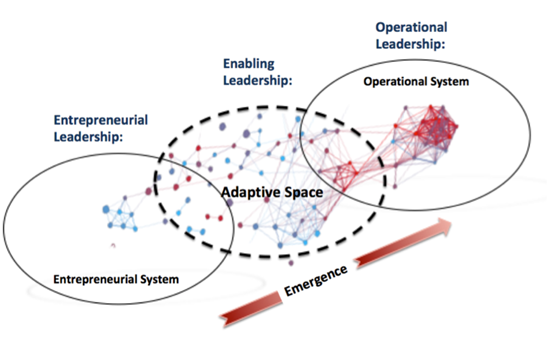“Lots of things that were seemingly impossible have now just happened”
Mary Uhl-Bien recently joined Matthew Mezey and me for a virtual conversation to share Mary’s insights on the current complex challenges COVID-19 brings, and illustrate these insights with examples from USA and UK.
At 5.56 Mary explains that when we see rapid spread of innovations this is classic complexity and means that a window for change, an ‘adaptive space’, has opened up but this may only be open for a short time.

These temporary adaptive spaces facilitate the movement of innovative ideas and information across a system by connecting individuals. This contrasts with the usual focus on making the operational system ever more efficient.
Recent US examples of the rapid spread of innovation described include:
- Telehealth, physicians have resisted it and now suddenly moved to it and love it, so it is probably here to stay if it gets embedded [9.36]
- Working from home, the administrators had resisted it and now see the benefits [10.45]
- Zoom for virtual conference, very quickly people tried it and accepted it as they see the benefit [16.33]
A recent NHS example is Testing Methods 2020, part of the government response to COVID-19 to find new solutions to coronavirus testing. This initiative created an adaptive response at a national level involving collaborative work across different organisations, disciplines and professions at great speed and with great success. This demonstrates how the response to complexity should work with the entrepreneurial and local working with national coordination, as mentioned in a previous blog.
These are examples of classic complexity where pressure in a system can open up adaptive space and quickly bring in a new way of working
These are examples of classic complexity where pressure in a system can open up adaptive space and quickly bring in a new way of working. Rapid change has happened where the system was poised for change, and where options for new ways of working were available.
The COVID-19 crisis has produced a certain set of circumstances and unlocked, or unfrozen, the system so rapid change can occur. The difference right now is the ‘wall of resistance‘ is down e.g. physicians and telehealth, and with walls down, connections can be made and things change quickly.
We have a rare window of opportunity. The system is unlocked, organisations are loosened up for change and adaptive space created, so we need to get innovations in and embedded as the new way of working.
We need to consider what are the things that can be spread, adopted and embedded, the things we have been trying to have happen, as the opportunity window is open now but will soon close.
“We have a rare, very rare and unique opportunity because adaptive space is here, windows for change are opened up, those are going to close and the system will lock back in again”
How can we maintain the current environment of adaptive space and stop it locking back into a rigid system?
We need to keep the walls of resistance down, maintain the openness to collaboration and continue to come together and work together in open, more trusting relationships to enable change. Agreeing an explicit shared purpose to provide a unifying effect and strong desire to work together, as with the initial response to COVID-19, is essential.
Adopting an ‘enabling leadership’ style will support spread and adoption by creating adaptive spaces and the conditions to allow people to come together to collaborate for change (which I will explore further in a forthcoming blog).
Other blogs based on this conversation with Mary Uhl-Bien explore:
- COVID-19 crisis: a complexity leadership response
- The importance of local adaptation in innovation spread and adoption
- Why an ‘enabling leadership’ style is needed for innovation spread and adoption
If you’re interested in how to enable the spread and adoption of innovations in healthcare, there are previous blogs and further blogs to follow. Please do subscribe to this blog and follow @DianeKetley, @HorizonsNHS, #nhsspread.
Further information and reading
NHS Horizons’ work on spread and adoption of innovation, and forthcoming online publication, is informed by Mary’s work. We identify the need for a new mindset with an increased understanding of complexity and interdependencies, the need to create a pull of innovation alongside the traditional push approach with attention to relationships and the impact of asking people to change their routines and behaviour.
M. Uhl-Bien. How ‘Adaptive Spaces’ enable innovation in healthcare and beyond. 2019. Q community webinar.
M. Uhl-Bien. How to master the art of creating ‘Adaptive Spaces’. 2019 Q community webinar
M J Arena, M Uhl-Bien. Complexity Leadership Theory: Shifting from Human Capital to Social Capital in People + Strategy, 2016 – open access
M Arena, R Cross, J Sims, M Uhl-Bien. How to Catalyse Innovation in Your Organisation in Sloan Management Review, 2017
D Ketley. Adaptive Spaces, Networks…. and a Challenge Called Spread. Horizons blog. 2019.
Professor Mary Uhl-Bien, Ph.D. is BNSF Railway Endowed Professor of Leadership at Neeley School of Business at TCU, Texas, USA.
This blog is one in a series and was originally posted on the NHS Horizons website.